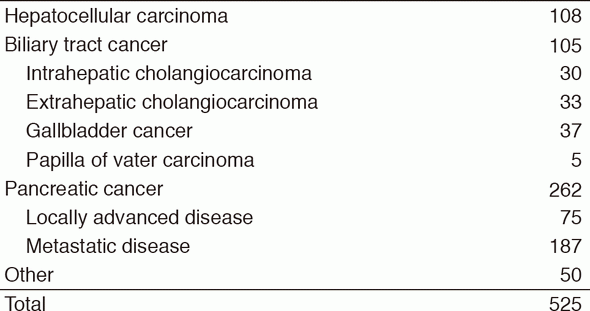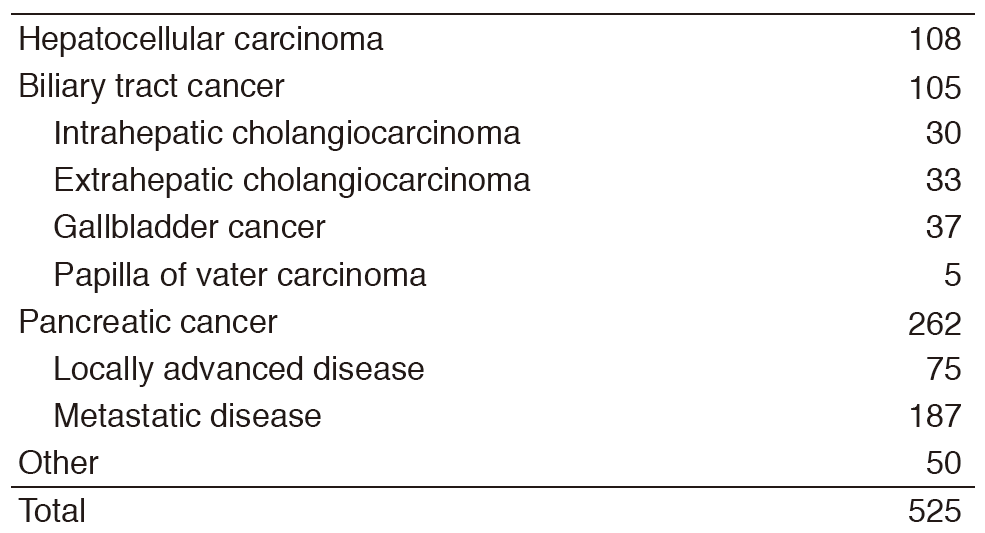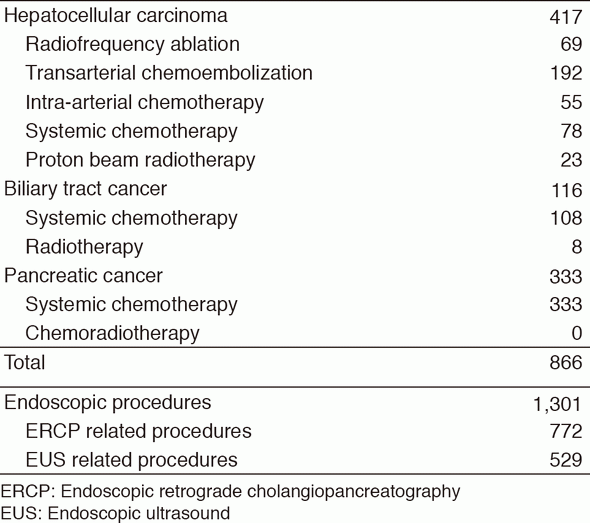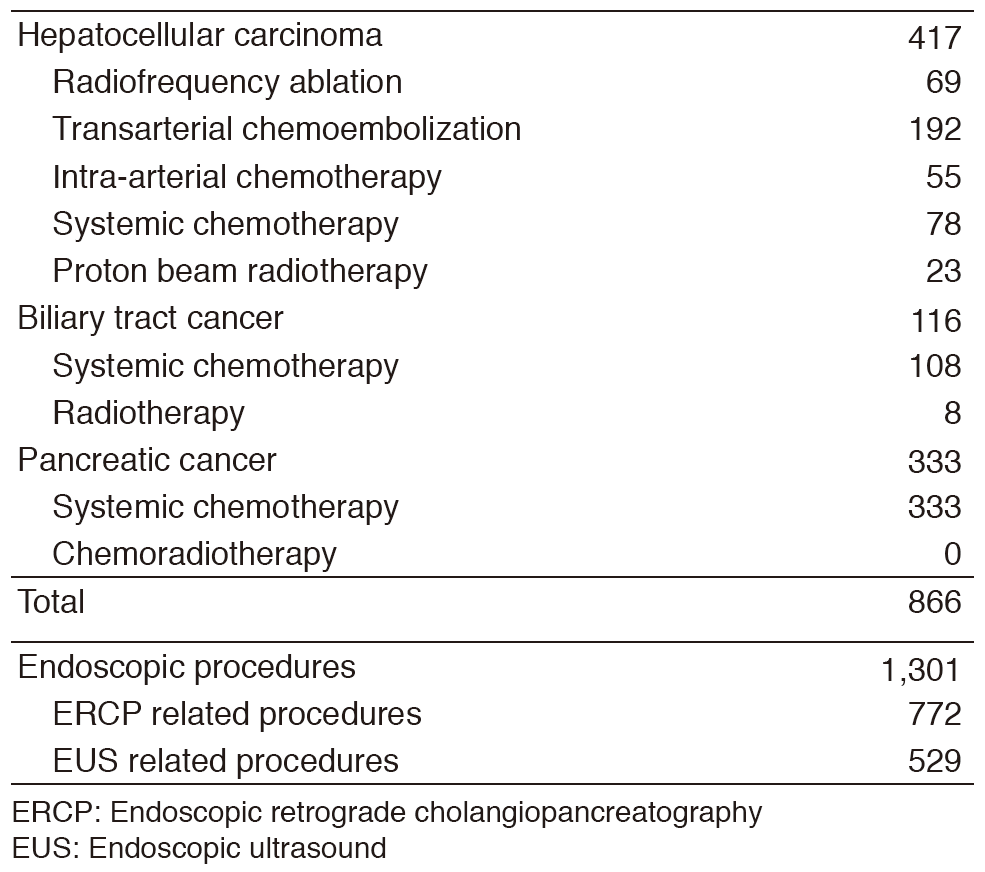HOME > Publication & Reports > Annual Report 2016 > Hospital East
Department of Hepatobiliary and Pancreatic Oncology
Masafumi Ikeda, Shuichi Mitsunaga, Izumi Ohno, Hiroshi Imaoka, Yusuke Hashimoto, Hideaki Takahashi, Mitsuhito Sasaki, Kazuo Watanabe, Kumiko Umemoto, Gen Kimura
Introduction
The Department of Hepatobiliary and Pancreatic Oncology is responsible for the diagnosis and treatment of patients with hepatic, biliary, and pancreatic cancers as well as the interventional management by endoscopic or percutaneous procedure. Our goal is to provide high-quality cancer treatment with adequate palliative care, and to develop novel and effective treatments and procedures through well-designed clinical trials and researches.
Our team and what we do
Our department is composed of seven staff oncologists and three residents, with the average of 49 beds in the hospital and conduct clinical rounds for admitted patients every morning and evening. The treatment strategies for individual patients are discussed in weekly tumor board conferences attended by medical oncologists, surgeons, radiologists, radiation oncologists, and pharmacists. Furthermore, we are responsible for endoscopic abdominal ultrasonographic examinations, endoscopic or percutaneous ultrasound-guided biopsies of abdominal masses, local ablative therapy for liver tumors, endoscopic or percutaneous biliary drainage, abscess drainage and stenting for obstructive jaundice, etc.
Research activities
1.Hepatocellular carcinoma (HCC)
Until now, Sorafenib is the only available standard of care for advanced HCC. Regorafenib has demonstrated to provide survival benefits in HCC patients progressing on sorafenib treatment. In a phase III trial of lenvatinib vs. sorafenib as the first line setting, lenvatinib showed non-inferiority to sorafenib in terms of survival. These two agents have been anticipated to show promise as a standard treatment for patients with advanced HCC. Therefore, we constituted a medical team for a future development plan to intensify the efficacy and for the management and supportive care of toxicities.
2.Pancreatic cancer (PC)
Gemcitabine (Gem) plus nab-paclitaxel and FOLFIRINOX has been established as a first line treatment of advanced PC, and both regimens are often used for advanced pancreatic cancer on daily practice. We conducted the retrospective comparison study to clarify which regimen was better as a first line chemotherapy and a second line chemotherapy, and evaluated the usefulness of the management for peripheral neuropathy, such as duloxetine.
3.Other researches
We investigated the value on the diagnosis and response evaluation of serum microRNAs on highly sensitive microarray in PC and biliary tract cancer (BTC) along with the usefulness of endoscopic procedures, such as celiac plexus neurolysis.
Clinical Trials
Forty-five clinical trials (sponsored: 30 trials, investigator-initiated: 15 trials) are ongoing, and 12 clinical trials (sponsored: eight trials, investigator-initiated: four trials) are being planned for the upcoming year. Recently, immune checkpoint inhibitors are noticed in all cancer treatment, and sponsored trials of these agents or combination therapies with these agents are increasing in this field (ongoing: nine trials, planning: five trials).
1.HCC
A randomized phase II trial comparing transarterial chemo embolization (TACE) using drug eluting Beads vs. conventional TACE (PRESIDENT) is ongoing. Some sponsored trials of sorafenib plus BBI503 as the first line chemotherapy, and nivolumab, Lenvatinib plus pembrolizumab, ramucirumab, codrituzumab plus atezolizumab, MSB0011359C as the second line chemotherapy are ongoing.
2.BTC
A randomized phase III trial comparing adjuvant S-1 with observation in patients with resected BTC (JCOG1202) is ongoing. Some sponsored trials of Gem cisplatin plus nivolumab as first line chemotherapy and resminostat plus S-1, nivolumab, MSB001359C, MEDI4736 plus tremelimumab, etc. for advanced BTCs refractory to Gem are ongoing.
3.PC
Several clinical trials of neoadjuvant S-1 and concurrent radiotherapy for borderline resectable PC (JASPAC05), Gem plus nab-paclitaxel vs. modified FOLFIRINOX for locally advanced PC (JCOG1407), Gem plus oxaliplatin for familial PC (FABRIC) as the first line setting are ongoing. Some sponsored trials of BAX2398+5-fluorouracil/ leucovorin, etc. are ongoing as the second line setting.
Education
For our residents, one-to-one training is provided on the daily practice of the management of inpatients and outpatients, in which they can learn the indication, administration, and management of adverse events from loco-regional treatments to systemic chemotherapy for hepatic, biliary, pancreatic cancer patients, and the accompanied procedures to make a diagnosis and interventional management, and so on. In addition, they can make presentations of their research domestically, hold worldwide meetings, and make a paper in English under the instruction of staff physicians.
Future prospects
The prognosis of patients with hepatic, biliary, and pancreatic cancers remains dismal, and standard treatments for these cancers are limited. In Japan, incidences of these types of cancer, especially HCC and BTC, are higher than those in western countries. Therefore, we must conduct a lot of novel and promising clinical trials and research that take the lead worldwide. And it is necessary to develop biomarker research and endoscopic management accompanying cancer treatment.
List of papers published in 2016
Journal
1.Mitsunaga S, Ikeda M, Shimizu S, Ohno I, Takahashi H, Okuyama H, Ueno H, Morizane C, Kondo S, Sakamoto Y, Okusaka T, Ochiai A. C-Reactive Protein Level Is an Indicator of the Aggressiveness of Advanced Pancreatic Cancer. Pancreas, 45:110-116, 2016
2.Shoji H, Morizane C, Sakamoto Y, Kondo S, Ueno H, Takahashi H, Ohno I, Shimizu S, Mitsunaga S, Ikeda M, Okusaka T. Phase I clinical trial of oral administration of S-1 in combination with intravenous gemcitabine and cisplatin in patients with advanced biliary tract cancer. Jpn J Clin Oncol, 46:132-137, 2016
3.Sawada Y, Yoshikawa T, Ofuji K, Yoshimura M, Tsuchiya N, Takahashi M, Nobuoka D, Gotohda N, Takahashi S, Kato Y, Konishi M, Kinoshita T, Ikeda M, Nakachi K, Yamazaki N, Mizuno S, Takayama T, Yamao K, Uesaka K, Furuse J, Endo I, Nakatsura T. Phase II study of the GPC3-derived peptide vaccine as an adjuvant therapy for hepatocellular carcinoma patients. Oncoimmunology, 5:e1129483, 2016
4.Ikeda M, Sato A, Mochizuki N, Toyosaki K, Miyoshi C, Fujioka R, Mitsunaga S, Ohno I, Hashimoto Y, Takahashi H, Hasegawa H, Nomura S, Takahashi R, Yomoda S, Tsuchihara K, Kishino S, Esumi H. Phase I trial of GBS-01 for advanced pancreatic cancer refractory to gemcitabine. Cancer Sci, 107:1818-1824, 2016
5.Okusaka T, Otsuka T, Ueno H, Mitsunaga S, Sugimoto R, Muro K, Saito I, Tadayasu Y, Inoue K, Loembe A-B, Ikeda M. Phase I study of nintedanib in Japanese patients with advanced hepatocellular carcinoma and liver impairment. Cancer Sci, 107:1791-1799, 2016
6.Ikeda M, Yamamoto H, Kaneko M, Oshima H, Takahashi H, Umemoto K, Watanabe K, Hashimoto Y, Ohno I, Mitsunaga S, Okusaka T. Screening rate for hepatitis B virus infection in patients undergoing chemotherapy in Japan. Int J Clin Oncol, 21:1162-1166, 2016
7.Ikeda M, Okusaka T, Mitsunaga S, Ueno H, Tamai T, Suzuki T, Hayato S, Kadowaki T, Okita K, Kumada H. Safety and Pharmacokinetics of Lenvatinib in Patients with Advanced Hepatocellular Carcinoma. Clin Cancer Res, 22:1385-1394, 2016
8.Ueno M, Okusaka T, Omuro Y, Isayama H, Fukutomi A, Ikeda M, Mizuno N, Fukuzawa K, Furukawa M, Iguchi H, Sugimori K, Furuse J, Shimada K, Ioka T, Nakamori S, Baba H, Komatsu Y, Takeuchi M, Hyodo I, Boku N. A randomized phase II study of S-1 plus oral leucovorin versus S-1 monotherapy in patients with gemcitabine-refractory advanced pancreatic cancer. Ann Oncol, 27:502-508, 2016
9.Kudo M, Ikeda M, Takayama T, Numata K, Izumi N, Furuse J, Okusaka T, Kadoya M, Yamashita S, Ito Y, Kokudo N. Safety and efficacy of sorafenib in Japanese patients with hepatocellular carcinoma in clinical practice: a subgroup analysis of GIDEON. J Gastroenterol, 51:1150-1160, 2016
10.Ikeda M, Shimizu S, Sato T, Morimoto M, Kojima Y, Inaba Y, Hagihara A, Kudo M, Nakamori S, Kaneko S, Sugimoto R, Tahara T, Ohmura T, Yasui K, Sato K, Ishii H, Furuse J, Okusaka T. Sorafenib plus hepatic arterial infusion chemotherapy with cisplatin versus sorafenib for advanced hepatocellular carcinoma: randomized phase II trial. Ann Oncol, 27:2090-2096, 2016
11.Cheng A-L, Thongprasert S, Lim HY, Sukeepaisarnjaroen W, Yang T-S, Wu C-C, Chao Y, Chan SL, Kudo M, Ikeda M, Kang Y-K, Pan H, Numata K, Han G, Balsara B, Zhang Y, Rodriguez A-M, Zhang Y, Wang Y, Poon RTP. Randomized, open-label phase 2 study comparing frontline dovitinib versus sorafenib in patients with advanced hepatocellular carcinoma. Hepatology, 64:774-784, 2016
12.Ueno H, Ikeda M, Ueno M, Mizuno N, Ioka T, Omuro Y, Nakajima TE, Furuse J. Phase I/II study of nab-paclitaxel plus gemcitabine for chemotherapy-naive Japanese patients with metastatic pancreatic cancer. Cancer Chemother Pharmacol, 77:595-603, 2016
13.Shiba S, Morizane C, Hiraoka N, Sasaki M, Koga F, Sakamoto Y, Kondo S, Ueno H, Ikeda M, Yamada T, Shimada K, Kosuge T, Okusaka T. Pancreatic neuroendocrine tumors: A single-center 20-year experience with 100 patients. Pancreatology, 16:99-105, 2016
14.Doi T, Lee K-H, Kim T-M, Ohtsu A, Kim TY, Ikeda M, Yoh K, Gallo Stampino C, Hirohashi T, Suzuki A, Fujii Y, Andrew Williams J, Bang Y-J. A phase I study of the human anti-activin receptor-like kinase 1 antibody PF-03446962 in Asian patients with advanced solid tumors. Cancer Med, 5:1454-1463, 2016




